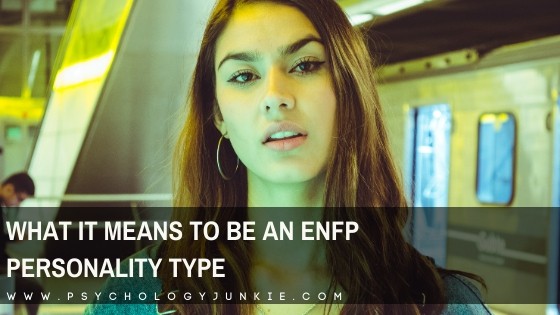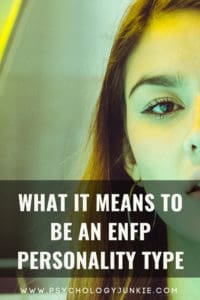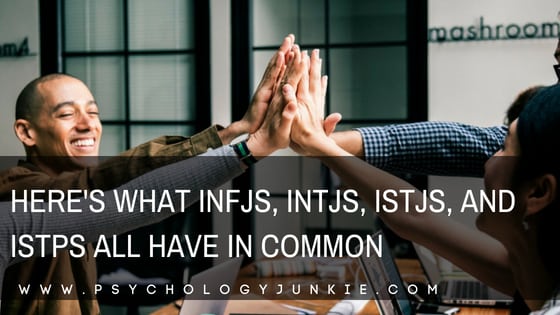What it Means to be an ENFP Personality Type
The Innovative, Inspiring Type
Creative, Adventurous, Imaginative, Authentic
The ENFP Personality Type in Brief
ENFPs approach life with a desire to explore all the options available to them. They quickly generate alternatives, ideas, possibilities, and new ways of doing things. When they look around them, they can notice two unrelated things and find ways of bringing them together creatively. For example, they might read about personality type and put on their jewelry in the morning only to realize they could sell beaded bracelets with beaded letters for each personality type! They like to look at life from many angles and enjoy exploring all the alternatives and angles before making a decision or judgment about something. This makes them open-minded and perceptive – but it can also make them prone to procrastination and indecision at times.

ENFPs have many talents – they are the Imagineers, inventors, counselors, writers, and advocates of the world. They believe in generating ideas that align with their deeply-held values and beliefs. Whether their cause is crusading for human rights or planting more trees in the rainforest, they find unusual ways to inspire people to join their vision. It’s hard to be around an ENFP and not find yourself caught up in their dreams for the future.
- Driving Force: To generate ideas, possibilities, and new ways of doing things. To explore theories, innovate, and create opportunities.
- Backup Strength: To live a life in alignment with their deeply-held values and ethics. To stand up for a cause they believe in. To experience inner harmony and integrity with one’s self.
- Weaknesses: May be so focused on new ways of doing things that they “re-invent the wheel” and struggle to create consistent routines. May be so focused on the big picture that they lose sight of the details.
- Stressors: Constraints on brainstorming, rigid rules and schedules, repetition, boredom, lack of stimulation from the outside world, too much time alone.
Not sure what your personality type is? Take our new personality questionnaire!
What does ENFP mean? An introduction to the four-letter type code
E = Extroversion. ENFPs focus on the world around them to find inspiration, ideas, and energy.
N = iNtuition. ENFPs prefer focusing on abstract possibilities and ideas rather than concrete data. They prefer imagining what could be rather than dwelling on what “is.”
F = Feeling. ENFPs apply personal values and ethics to decision-making. They want to live in congruence with their moral code and they consider the emotional impact a decision will have on others.
P = Perceiving. ENFPs like having a lot of options and tend to be adaptable and spontaneous. They like to mix work with play and enjoy an exploratory approach to life.
Rumored Famous ENFPs: Hunter S. Thompson, Oscar Wilde, Anne Frank, Michio Kaku, Osho, Anais Nin, Salvador Dali, Ellen DeGeneres, Robin Williams, Daniel Radcliffe, Shailene Woodley, J.J. Abrams, Shia LaBeouf, Joseph Gordon-Levitt.
ENFP Overview
When you’re trying to research what it really means to be an ENFP, you’ll see a lot of different information. These types have a talent for innovating, inspiring, and finding solutions in chaotic situations. They are at their best when they are allowed to ask questions, generate outside-the-box solutions, and catalyze change. For the ENFP, the world around them is a starting place for numerous connections, possibilities, and potential experiences. They might look at a tree and imagine the treehouse they could build, a creative idea to make Arbor Day more popular, or they might imagine the tree as a towering knight protecting the forest and all the creatures within. Their imagination comes alive with stories, hypotheses, and ideas.
It’s vital to ENFPs to tie their ideas to their deeply-held value system. Throughout their lives they are sifting through “truths” and beliefs, trying to discern which feels the most right to them. They want to fight for things that are deeply important to them personally – not just what society deems important. They don’t mind being misfits – in fact, they would usually prefer to be unusual rather than “normal.” That is, unless everyone else is trying to be weird – then they might try as hard as possible to be as ordinary as possible just to rebel.
ENFP Championing
ENFPs believe in standing up for the underdogs and marginalized people of the world. They have a heart for misunderstood people, overlooked animals, and creatures given less significance and esteem than the “famous” or “popular” people in their environment. They will often fight so that everyone has a voice, using their creativity and imagination to draw the world’s attention to their cause.
Although ENFPs are extroverts, they greatly enjoy their alone time. In the tranquility and peace of solitude, they can delve into their inner passions, imagination, and feelings. This is where they sort out the ideas, values, and experiences they’ve encountered and sift out the moments and truths that were most meaningful to them. They aren’t afraid to toy with “dark” ideas, explore unusual themes, or question traditions and conventions. It’s vital to ENFPs that they live an authentic life and focus their energy on what’s personally significant and important to them.
In careers, ENFPs prize novelty, creativity, and a variety of tasks. They don’t mind taking risks if it opens up more possibilities and freedom for them. They might take jobs that have a higher turnover rate simply because they offer opportunities for travel or higher pay. Or they might pursue risky creative careers because their values are calling them to express themselves in this way. These types aren’t typically fond of “traditional” 9-5 office jobs. They are more likely to take the road less traveled when it comes to careers and pursue something that stirs their passion and imagination.
“The good news is that you don’t know how great you can be! How much you can love! What you can accomplish! And what your potential is!” – Anne Frank, a rumored ENFP
At Their Best:
Healthy ENFPs are insightful, authentic, versatile, and imaginative. They can see patterns and connections that evade many other types – creating options, visionary ideas, and opportunities that inspire the people around them. They often take on the role of catalyst for change because of their electrifying vision of future possibilities.
At this level, they don’t feel like they have to try to stand out and be different. Open-minded and curious, they are able to appreciate the gifts of other types and affirm those gifts. Finishing what they start becomes easier and stability becomes more natural to them. They have more ease prioritizing sleep, healthy nutrition, and self-care. Variety in people excites them, and they appreciate people who are different than themselves and have different perspectives to offer. They are very empathetic and have a knack for just “being” with someone instead of getting distracted by other options, activities, and experiences.
Average ENFPs:
At an average level, ENFPs are flexible, imaginative, innovative, and spontaneous. Highly focused on future possibilities, they are comfortable with taking risks and pursuing change. They usually appear team-focused, enthusiastic, supportive, and friendly. They are good at motivating a team and getting people motivated towards a future vision or possibility.
At this level, ENFPs can struggle with attention-to-detail and often have difficulty finishing tasks. It’s easy for them to get distracted and they may feel constantly pulled by new, intriguing ventures – forgetting that the project they’re in the middle of was intriguing at one point. They may rationalize away reasons to be cautious and do things the traditional way – and this can cause them detriment in the long-run. They may forget to take care of themselves, double-check their work, or they may waste energy changing things that don’t need to be changed.
Unhealthy ENFPs:
At an unhealthy level, ENFPs tend to be distracted, hasty, and lacking in self-control. For some ENFPs, their intuition becomes warped at this level. They may chase possibilities and new ideas, but forget to check in with their value system and ethics. Other ENFPs who have been unable to develop their intuition properly become over-reliant on their feeling process. They may become self-righteous and overbearing about what they believe is right without being tolerant of other people’s views.
At this level, they tend to be very judgmental of people who are different from themselves. If they are optimists (which ENFPs often are), they tend to have a very low tolerance for people who are pessimistic. They view people with opposite type-preferences as “less evolved” than themselves. They may believe they are very understanding and good with people, but actually be very unaware of how they come across in reality.
Personal Growth Recommendations for ENFPs:
- Make sure that in the midst of all your ideas and activity that you make time for your health. Try to get at least 7 hours of sleep per night. If this feels de-motivating, just remember how much more creative you’ll be when you’ve had that rest. Set reminders on your phone to drink enough water.
- Develop your intuition by considering things you’ve always wanted but deemed impossible. What could you change to make those things possible? Brainstorm!
- Develop your feeling side by examining what you passionately care about. When someone asks you to do something, assess whether it lines up with your values and desires. If you realize that you don’t enjoy the action or it compromises one of your values, don’t do it. Spend time in quiet surroundings assessing what’s important to you, what you’d live and die for, and what your true values are.
- Pick a goal that you’ve set for yourself and see how you can make it measurable and specific. For example, instead of “I want to start my own business,” change it to, “I want to choose my business name on Friday, apply for a sole-proprietorship over the weekend, and create my web site with WordPress on Monday.”
- Think of a part of your life that is inefficient or chaotic – how can you create a routine to simplify that part of your life? How can you make that routine something that you enjoy?
Find out more about your personality type in our eBooks, Discovering You: Unlocking the Power of Personality Type, The INFJ – Understanding the Mystic, and The INFP – Understanding the Dreamer. You can also connect with me via Facebook, Instagram, or Twitter!
Learn More About Your Type:
The Best and Worst Parts About Being an ENFP Teenager
10 Things That Excite the ENFP Personality Type
Here’s What Makes ENFPs and ESFPs So Amazing (and How to Tell Them Apart!)
What ENFPs Do When They Get Really Stressed Out













This is so true in so many levels. I literally wanted to laugh out loud as I read the part about get 7 hours of sleep even though I may want to brainstorm ideas.
This is especially hilarious for me bc it’s 4:28am and I just woke up (as I do about 1-2 week) bc I had an idea that I needed to get out on paper. ????
Thanks for the reminder! I’m going back to sleep now.